Tagged: business
It's been a good day for business
- by Alyson Shane
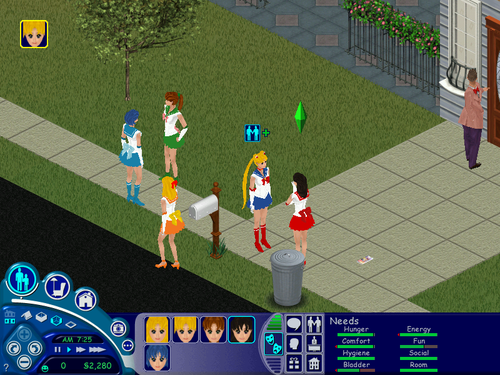
I inked a new deal, two new hot leads fell into my lap and I'm 99% sure they're gonna close, and I finally finished the giant "how to write good SEO copy" blog post I've been working on all week.
I don't talk about my business much on here because a) this is my personal blog and b) I assume you guys don't wanna know about it, but I feel like my agency is on a real upswing lately and that feels really fucking good and I wanna talk about that.
I've been hearing from a lot of people that the stuff we say about
focusing on good content
providing value
and being strategy and process-driven
really resonates with them
and that feels great because those are my values being expressed through my agency.
Also I learned we have a reputation for being positive and helpful.
Last Friday one of the owners of the big, old agencies in town called me up and (after venting for several minutes)
asked me for help with Facebook.
I LOVE THIS.
I love that the owner of a place I sent a resume to out of university called me for help
I love that I'm considered enough of a subject matter expert to be the one to call
I love that he felt comfortable enough with me to talk about how he felt
and I LOVE that I have a reputation as someone people can call up out of the blue and ask for help.
What a life I lead.
What's weird about being in this position is that I never thought I'd be here.
I didn't want to be a business owner
I never wanted this kind of responsibility and pressure
I never thought I would be comfortable with the spotlight, or with monetizing my craft the way that I have
but a few years ago I was listening to a podcast and one of the hosts said a famous Andy Warhol quote that changed things for me. Here's how it goes:
"Being good in business is the most fascinating kind of art. Making money is art and working is art and good business is the best art."
When I heard it I felt like a light switched on in my head because — eureka! — I had a framework for understanding what I was trying to do.
Because what is art, anyway?
Art is creative output
Art is helping people and doing good
Art is creating something out of nothing
Art is being true to yourself and leading with your values
Art is about adding meaning and leaving your mark on this world before your memory is lost to the void of time.
I want my business to be all of those things. It is all of those things.
And the fact that I can articulate that in our marketing and speaking and consulting I do
and it resonates with people and makes them want to work with us
is the best damn feeling I could ask for.
On my agency and values
- by Alyson Shane

(Right around the time I started freelancing, in 2014. Photo via Rachael Hosein.)
I've been thinking a lot about values recently.
Earlier this week, I got an email stating that Starling Social was awarded the title of "Best Boutique Social Media Marketing Agency in Winnipeg" by the Canadian Business Awards, and it's been making me reflect on what that means to me. Not just in the quality of the services we offer, but about my business in general and the kind of boss I strive to be.
I didn't want to become a businessperson. Hell, even after I started freelancing full-time I was very resistant to the idea of running an agency. I'd worked for a few agencies, both big and boutique, and every experience I had left me with a sour taste in my mouth in one way or another.
I worked at a big agency right out of university. I was over the moon about it even though I struggled in my role.
(Anyone who knows me knows how much I rely on process + documentation, and this job had none of that structure.)
Despite this, I was happy to come in at 7 AM, an hour and a half before my day started, just to stay on top of everything we had going on.
One morning the President of the company walked by and noticed me working away by myself. We started talking and he said he'd noticed me coming in early and he was impressed with my work ethic. We talked about my future in the company, and I asked if he would mentor me and he said yes.
The next week I was fired. I don't even know why — when I asked, one of the people in the meeting said I'd "made a mistake that cost the company $1000" but when I asked what it was, he said he couldn't remember. I'd been there for over a year and they let me go without providing any documented or legitimate reasons.
(Told you there was no documentation there.)
Losing my job was devastating, but what felt worse was knowing that there was such a huge disconnect within that company that the President of the company saw me one way, and middle management saw me in a completely different way.
After that I started freelancing for a small, boutique agency. I loved that job, even more than the agency job because I got my first taste of remote work and having the flexibility to "work from anywhere". The owner seemed like a cool, interesting person and even though the pay was garbage, and ad-hoc, I trusted that they had my best interests at heart as a member of their team.
Then one day I logged into a client's Twitter account and noticed that there were a bunch of posts and replies that I hadn't written. I followed up with my boss, and here's what he said back:
;)
That wink turned out to mean that he'd hired someone new to manage the account and gave them the go-ahead to start without notifying me. When I asked for payment for the time I'd worked, I was told that the last few week's worth of work I'd done wouldn't be compensated.
I was told "I'll give you $60, which should be enough to buy a few 12-packs of beer" and shown the proverbial door.
A few years later as my freelancing business was starting to grow, the owner of a local agency called me up and asked if I wanted to join the team at a management level. It sounded promising, but I took issue with how the workload (and budget) were divvied up:
Essentially, there were only so many paid hours available per project and since everyone was a freelancer they were all competing for the same narrow pool of hours/money. I'd be coming in at a senior level, which meant I'd be getting a guaranteed retainer that would be taken from the pool of money otherwise allocated to the team actually doing the work.
When I brought this up, the owner said "the girls will figure it out, don't worry about it"
(did I mention this was an agency run by one guy who seemed only to hire pretty, skinny women? Ick.)
Needless to say, I didn't take the job. I wasn't comfortable being complicit in screwing over these other women and working with someone who cared so little about the people he employed.
By this time I was already working for myself and starting to scale up a team to help me manage my workload. I know I wasn't great at managing people at first, but the experiences I'd had showed me a lot of what not to do and I was able to start being the kind of boss I'd always wanted to have.
I got to become someone who goes to bat for my team and puts them first. I fired our first "big client" out of NYC and lost us 1/3 of our monthly revenue because he was being abusive to my copywriter. That was a blow, but I'd do it all over again and probably sooner if given the chance.
(Nobody messes with my team.)
I got to become someone who put effort into supporting the people who work for me. I remember how lost I felt at the big agency, so I obsessively document every step of everything we do; internally, and for our clients. I make myself available for support, clarity, and advice, but my team can work confidently on their own because they have a documented framework that helps them be better at what they do.
(Protip: giving people a framework for success is how you guarantee a high degree of quality and attention to detail.)
I got to become someone who leads with their values. I'm honest with my team, whether it's good or bad feedback, because I remember what it felt like to have the rug pulled out from under me when I thought everything was going fine.
(Trust in your people and they will trust you, in kind.)
I'm not perfect — hell, nobody is — but the reason my company does such good work is because I'm value-driven, and leading with my values has attracted people who share those same beliefs. We believe in going above and beyond for our clients, in being data-driven and process-focused, and most of all we believe in each other and in our collective ability to raise the bar on what a digital marketing agency can be.
Every day I feel lucky as hell to run this business and to work with such amazing people.
This award recognizes my agency, but I want to end this (somewhat rambly, stream-of-consciousness) post by saying to my team:
I see you. I see your hard work, your dedication, and your passion, and I feel privileged to work with you. I've become a better person for it, and I appreciate the opportunity to build a company that's built such a strong reputation for creative, high-quality work with you.
Thank you, from the bottom of my heart.
Applied for another business number today
- by Alyson Shane
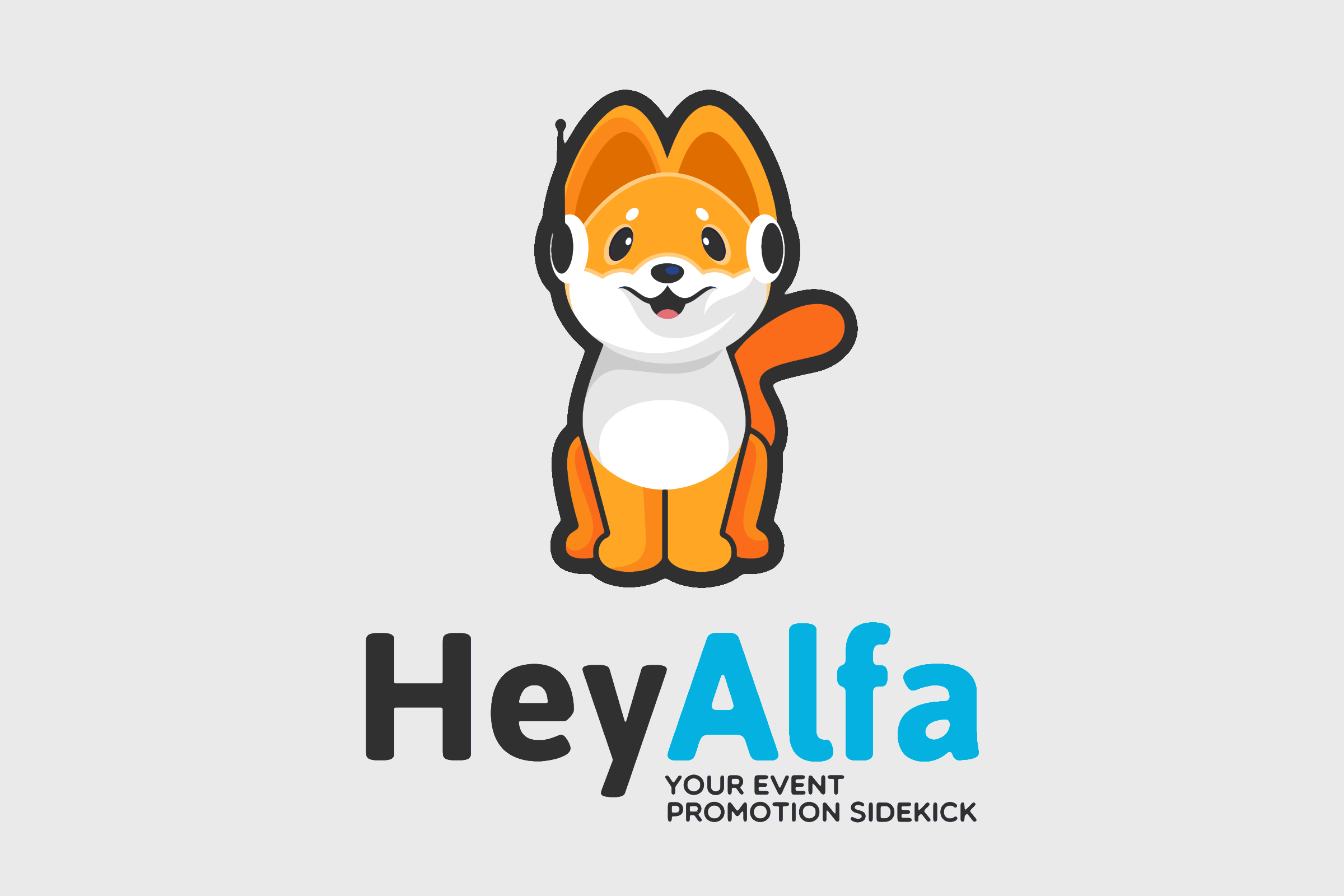
so now I officially own two businesses.
Or will soon, I guess.
We're building a company that does a really cool, unique thing and people are excited about it. Last week during a meeting with a beta tester they told me
"what you're building is wildly important"
which was a bit overwhelming but also...
I agree. It is an important idea.
I like solving problems (it's what I like about business) and lately I've been spending a lot of time working on a tool that solves a very specific problem in a really creative and useful way.
Best of all: it's efficient.
(I love efficiency.)
What I love more is working on something that makes people excited, and happy. Running a marketing agency is great, but solves different kinds of problem-solving than a piece of software and even though it makes me feel like I'm juggling a dozen balls at once
it's pretty effing exhilarating.
Wish us luck!
Dear Stephanie Wilkinson
- by Alyson Shane
Respect, girl.
It takes stones to ask the White House Press Secretary to leave your restaurant because her presence, and what she stands for
an administration that is systematically dismantling all of the progress that has been done in America over these last few generations
hates LGBTQ people
is racist and bigoted
promotes the kind of small-minded, partisan, xenophobic thinking that undoes the fabric of a national economy
undermines and attacks the CIA, FBI, and the Department of Justice
and works to systematically dismantle and disrupt global and unilateral organizations and treaties
rightfully made some of her staff upset. 
It must have been a tough decision because to be honest Trump supporters are scary. They're like rabid dogs and will bite you and try to pass on their poisonous hate to anyone and anything they can sink their teeth into.
Not to mention the fact that the person who is supposed to be in charge of running one of the largest and most influential countries on the planet
(okay, maybe not that part anymore since they're basically abandoning the rest of the world)
is so thin-skinned and uninterested in focusing on governing effectively that he'll weigh in on anything that gets his political base fired up.
If I were you, my heart would have been pounding as I walked up to that table. I can't imagine having to put myself and my business which employs other people at risk because a woman who thinks lying to the American people every day is just part of the job decided to stop by for a cheese board.
But I completely agree with your decision (especially since you have several gay people on staff who I'm sure were uncomfortable with her presence) and when you said:
“this feels like the moment in our democracy when people have to make uncomfortable actions and decisions to uphold their morals.”
Because we do. Maybe now more than ever.
And as business owners we have a responsibility to use our business to support and promote the values we believe in, even if that means taking a financial hit.
We're lucky enough to be in a position where we can channel our passions into something that adds to our communities and makes the world we live in a better place, and sometimes that means making hard decisions so we don't compromise our morals.
Stick to your guns, girl. You'll get through this.
And, for what it's worth, you just made me into a lifelong customer.
Two Years In
- by Alyson Shane
What did you want to be when you grew up?
When I was small I wanted to be a golfing farmer. Then I wanted to be an artist. Then I wanted to be a writer. Of course, nobody took the first one seriously, but pursuing a career in a creative field was strongly discouraged. "There's no money in creative pursuits" I was told, over and over again.
So imagine my surprise when I found myself sitting on the Roost rooftop patio a few weeks ago celebrating my second anniversary as a full-time business owner.
Not only do I get to do the creative work that I love to do (writing) every day, but I get to leverage the thing I love to do another thing that I love (helping people) while building the life that I want for myself. That's pretty incredible.
So with that revelation in mind, I wanted to touch on a few things that I've been reflecting on over the past few days as I ponder what got me here, and how things have changed in these past two years:
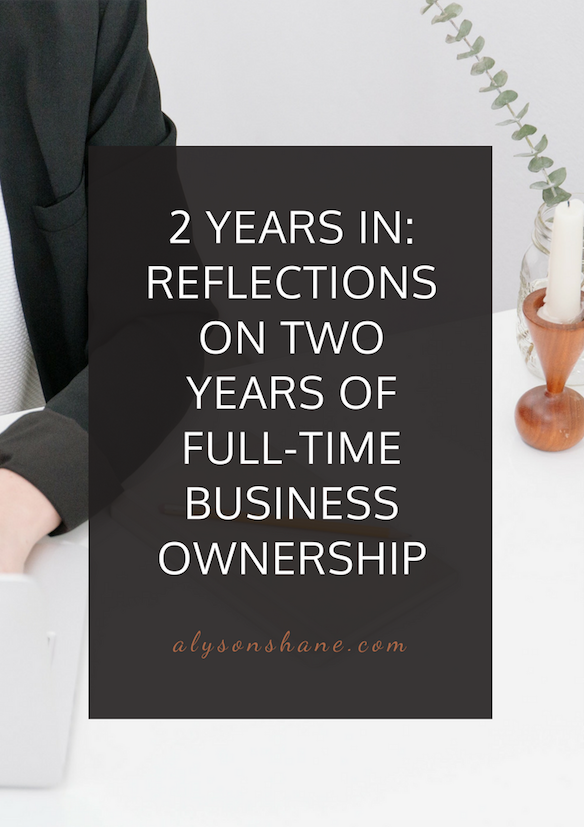
Outgrowing Corporate Life
The advice I got the most often when I was growing up was "find a job and keep your head down" which - in case you haven't met me - is the polar opposite of who I am as a person.
I'm not a lady who keeps her head down and her mouth shut, and it always proved challenging in work environments where I didn't have the control or opportunities to experiment, try new things, and get creative with problem-solving.
For a long time I thought it was character flaws that were keeping me from being a happy employee. Why couldn't I just fit in? Why did I have to challenge my supervisors when I thought I knew of a better way to do something? Why did I continue to lose motivation after the first few months of doing the same tasks day in and day out?
Mostly I wondered: why did everyone else not seem to have these same challenges?
It was crazy-making, and it wasn't until I started freelancing in 2014 that I started to experience the kind of control and freedom that I'd been looking for and failing to find in my corporate life.
I realized that the problem wasn't me, it was the work I was doing and the places I was doing it.
Let me be clear: there's nothing wrong with a corporate job if that's what you want, but for some of us it feels like trying to fit a square peg into a round hole every day.
It's nice to not feel that way anymore.
Finding Amazing Opportunities
The one thing that I don't think I was prepared for was the amount of opportunities that being a business owner afforded me, and how much those experiences have enriched my life.
I used to wile away my days at my desk, watching people on Twitter share talks and presentations and workshops and all these fun and exciting-looking opportunities. I wanted to be doing those things, but I didn't know how to get there.
Here's the thing about being a business owner, though: in order for your business to be successful you have to put yourself out there.
This is where that whole "being unable to keep my head down / mouth shut" aspect of my personality really acts as a blessing: I'm comfortable putting myself out there and getting up in front of people, so I'm comfortable with the hustle associated with promoting and building a business.
These days I write articles, run workshops, speak at conferences, and I even have my own print column. While, yes, I could have certainly leveraged my personal brand to find these opportunities, having a business gets me in front of other professionals in a way that being an employee at someone else's company didn't afford me. And honestly? That's probably the coolest part.
Learning to Manage Others
In 2016 my business grew enough that I began working with outside contractors to help manage my workload. By the time I rebranded and launched Starling Social earlier this year I'd already been working with contractors for a while, but formally announcing that we have a team felt like a huge accomplishment. Looking at our About Us page and seeing more faces than just my own is still a bit mind-blowing, and I'm so thankful to work with the passionate and dedicated people that I do.
On one hand, having someone help you manage your workload is a huge boon. On the other hand, sharing my thoughts and developing the processes needed to effectively on-board others was scary. My anxieties make me afraid of failure and "being wrong" and it was intimidating to open my business up to other people and let them in.
That being said, being forced to take a long, critical look at how and why I did things helped me gain a much deeper understanding of the value of using the right tools, processes, and documentation to run my business and serve our clients.
They say the best way to understand something is to teach it to someone else, and that applies in business, too.
Gaining Confidence
The single biggest change in the last two years is the confidence that I've developed as a result of being a business owner.
I can feel it permeating every conversation I have; there's a security, a solidarity in my sense of self that just wasn't there a few years ago. Of course, I still have moments (or days, or sometimes even weeks) of doubt and struggle, but overall working for myself and managing both clients and contractors has helped me grow into a significantly more confident person, both personally and professionally.
I have anxiety, and until recently I was seeing a therapist who was helping me work through some traumatic childhood experiences that contributed to those feelings. While therapy was invaluable (really, I can't recommend it enough if you feel like you need it) it was the daily practice of getting up, working by myself all day and facing my problems and challenges head-on, and reflecting about those challenges in a safe space that really contributed to my increased overall sense of well-being and confidence.
I really do believe that being your own boss is one of the best things you can do to build up your self-confidence. It pushes the boundaries of your comfort zone in so many small ways every day.
Moving Forward
Business is growing and these days it feels like I have more stuff to do than hours in the day, but that's okay. I'm learning to develop and maintain a work/life balance, which can be hard sometimes when your work is the thing you love to do.
I believe that people create their own luck, though to be perfectly honest most of the time it still feels like I stumbled into this amazing, stressful, and challenging opportunity even though I can look back and see the years of work and dedication that it took to get here, even if I didn't know that this was where I was going. And honestly, that's the coolest part: not knowing where this adventure is going to take me.
I'm really excited to see what the next few years bring my way.
Join me for a lunch + learn dedicated to personal branding
- by Alyson Shane
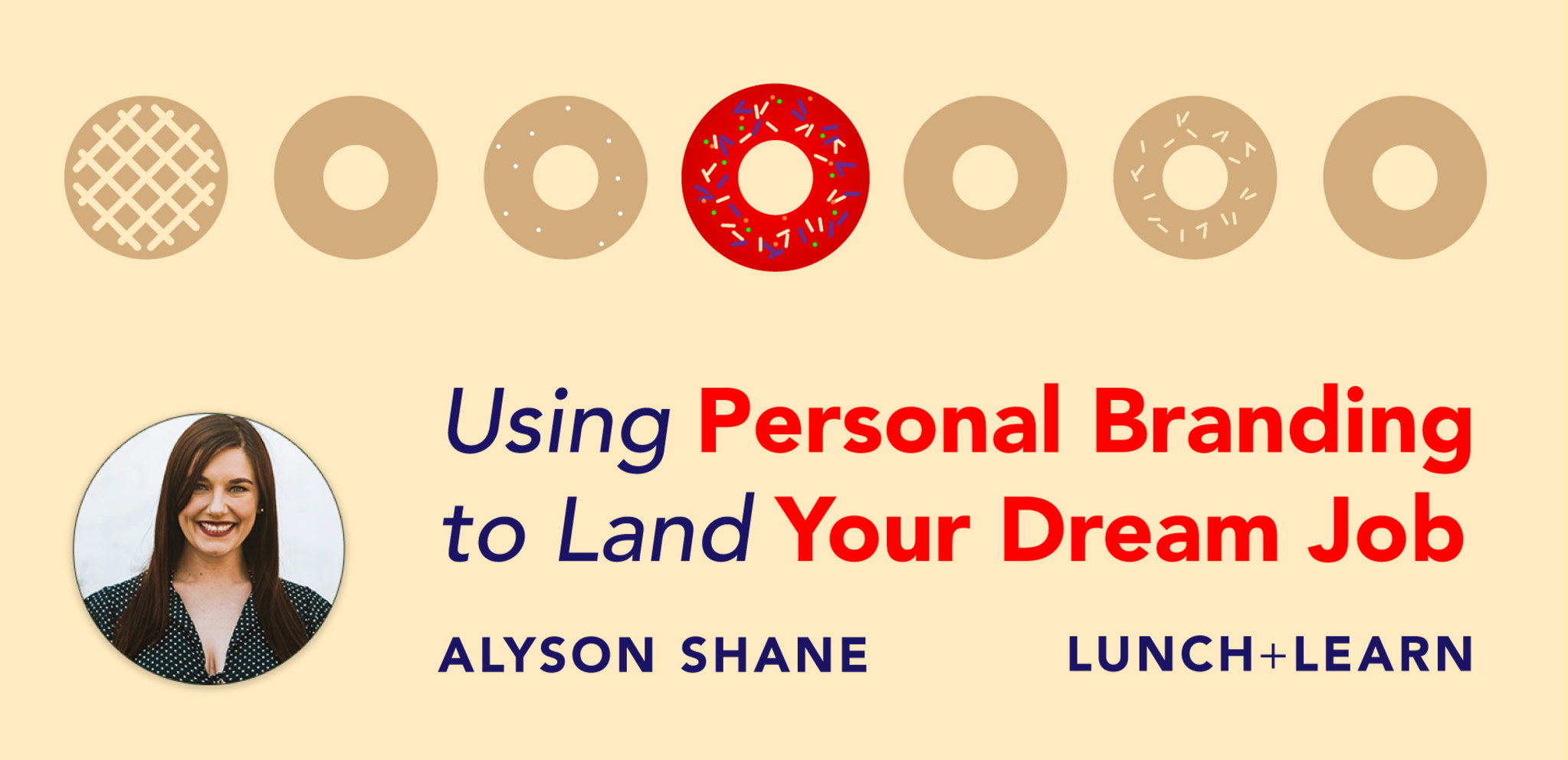
Figuring out who you want to be is daunting by itself - but what about figuring out who you are online?
If you've never thought about it before don't worry. Most people don't! In fact, most of us go about our daily lives, posting whatever we find, ranting about people that annoy us, and generally not giving a second thought to how the things we share might make us look to others.
Enter personal branding: the process of using social media and your digital presence to shape the narrative about who you are, what you do, and why you rock.
Why Does Personal Branding Work?
Many people think of personal branding as being inauthentic, or deliberately trying to pull the wool over people's eyes, but they couldn't be more wrong! I like to think of personal branding as the daily practice of putting your best foot forward and projecting the best version of yourself online.
Think about it this way: you're a smart, savvy professional who works hard and knows their shit, so why wouldn't you want people to know that about you right from the get-go?
What Can Personal Branding Accomplish?
I can say unequivocally that I wouldn't be where I am without my personal brand.
I realized several years ago (while I was in university, actually) that developing a strong presence online would help me get a job in my desired field and make connections, but I didn't really think too critically about it.
I posted to Twitter a lot and blogged regularly, which helped me start speaking and even landed me a segment on Shaw TV, but it wasn't until I shifted the focus of my website to be more "career-centric" and started sharing articles relating to social media and my industry that I started to acquire freelance clients and more speaking opportunities.
The more I shared, the more people began to see me as a local expert in my field, and as someone who could speak with authority about topics relating to my industry. I was able to accelerate this process by already having several years of online activity and recognition (aka, developing my personal brand!) to fall back on.
How Can You Develop Your Personal Brand?
Understanding how to shape your personal brand is one of the most valuable skills that we can learn in our digital age - I believe it's something we should teach everyone!
Luckily, there's no bad time to start developing your personal brand. It's really as easy as asking yourself some basic fundamental questions about yourself and your goals, signing in to your social accounts, and posting regularly.
Of course, there's a little more to it than that, which is why I'm hosting a lunch + learn with New Media Manitoba dedicated to helping you develop your personal brand!
Whether you're a student, freelancer, or professional looking to advance in your field and snag that killer new job, personal branding can help, and I'd love to show you how.
This event is FREE for NMM members, and only $10 for non-members, so what are you waiting for? RSVP and let's have some lunch and learn about how you can land your dream job by shaping how future bosses and clients think of you online.
Let's do this thing! Save your spot and let's get you that dream gig.
Introducing: Starling Social
- by Alyson Shane

What is Starling Social?
Starling Social is the name of my business. We specialize in social media management and copywriting (content marketing) designed to help our clients tell their stories and connect with their customers.
I started freelancing in the summer of 2014, and while working under my own name was great for a while, I realized that as my business started to grow and I began to bring on sub-contractors to help me manage my workload, that using my own name just wasn't going to cut it anymore.
I've been working on launching my new brand for the last half of 2016, so this feels like a really long time coming. I'm really excited to finally be sharing this news with all of you!
You can read more about Starling Social on our first blog post.
What Does This Mean for My Blog?
What it means is that I can (finally!) get back to the kind of writing that I enjoy: the kind which doesn't have to stick to a certain style, which discusses more of my life, opportunities, thoughts, and experiences.
One of the challenging things about being a freelancer was that I had to shift the primary focus of my blog to topics relating to my professional life. I've always been a big supporter of knowledge sharing, and by publishing content that was helpful and informative to others, it also helped demonstrate that I knew what I was talking about when it came to social media and content marketing.
While it was fun and refreshing at first, I quickly started to realize that the more I blogged about what I did, the less I blogged about who I am. What I care about, my values, and so on.
With this in mind, one of the biggest changes you'll notice here is that I'll be blogging more about my life. What I'm up to, my thoughts on being an entrepreneur and business owner, etc, reflections on my industry, and so forth.
What Comes Next?
You can follow along with everything that Starling Social is up to by visiting our website and blog, and following us on Facebook, Twitter, and Instagram.
You can also sign up for our newsletter and get a FREE copy of my new ebook Get Social! Content Marketing for You and Your Brand.
And me? I'll still be here, blogging away like I always have.
So hello, and welcome back. I've missed all of you.
Setting Intentions for 2017
- by Alyson Shane
2016 was a whirlwind year, and now that I'm home from our holiday trip to Windsor to visit John's family I finally have a little time to think, reflect, and plan my next moves for the coming year.
I'm not a big believer in "resolutions" to be honest; I prefer to look at each new year as an opportunity to commit to doing more positive things in general, rather than saying "this year I'll read 50 books!" or "I'm going to enter a bodybuilding competition in 2017" (lols for days).
Below are a few of the intentions I plan to set for the coming year, and some tips to help you set (and really work towards!) your own:
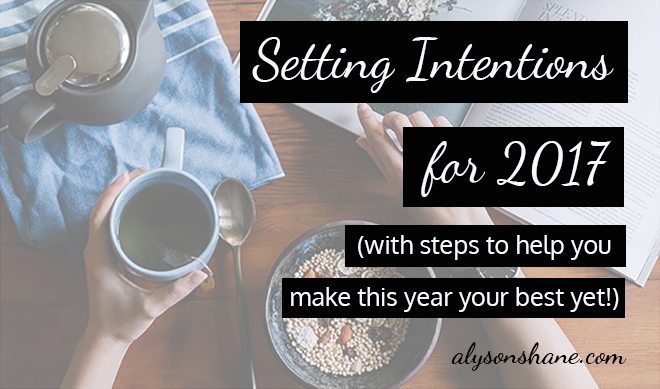
Do more yoga
A few months ago my friend Jackie and I went to Moksha Yoga Winnipeg for some hot yoga, and as I sweated and strained I felt the same kind of runner's high that I sometimes feel during a particularly good run. I left the class feeling renewed, exhilarated, and sweaty as hell, and it was wonderful.
Since then I've been trying to work doing yoga into my regular workout routine; I've been doing this easy 10-minute video at home during my 'lunch break' each afternoon. It's fast, simple, and a good way to break up my workday and spend a few minutes in a (somewhat) zen-like state.
In addition to all the feel-good mental benefits associated with doing yoga it just feels good to connect with my body and stretch out muscles that I don't normally use while sitting at my desk typing to you.
Your turn
Do you have any fitness goals in the coming year? Whether it's taking up running, swimming every day, or just stretching more during your linch break, here are some things to keep in mind:
- Costs. How much are you spending on fitness already? Are you willing to spend more? If you need special equipment, are you willing to invest additional funds?
- Time. Ask yourself honestly: how much time will this take each day, or week? Include travel time, changing, showering, etc in your estimate.
- Other obligations. Saying "I'm going to go to the gym every day!" is great in theory, but harder in practice. Block an average workweek out by hours, including commuting, meal prep, and other daily tasks to see how much time you reasonably have to meet your goals.
Delegate more (effectively)
One of my biggest learning moments came last year when I found myself looking dejectedly at the Crowdfunding Crash Course ebook I had been putting together. I'd spent heaps of time compiling the existing interviews, blog posts, and a bunch of extra goodies into an ebook format, only to totally and utterly lose steam when it came to designing the layout, which I didn't want to do.
I kept putting off the thing I didn't want to do until it felt like I'd put it off too long and the project felt irrelevant. I beat myself up really hard over it, and it's hard even admitting that I let it stagnate. However, it taught me an invaluable lesson: delegate tasks you don't like to the people who can do them for you.
That's why of my personal and professional goals is to delegate more of my workflow to others, and to learn to do so more effectively. Delegating properly and supporting the people who you work with means developing the proper systems to manage everyone's time and keep things on track, which I need to spend more time doing this year in order to meet this goal.
Your turn
Whether you're working in an office, a stay-at-home mom, or a busy business owner, knowing where you need help and asking for it can go a long way towards good mental health. Below are some things you can ask yourself before you start pushing to-dos off your plate:
- What tasks or processes do I enjoy doing the least? We tend to put off and procrastinate on tasks that we don't enjoy. Identify the ones you like the least (doing your taxes, following up with clients, etc) and find people who can help you do them.
- Ask: can I trust this person to do a good job? Take time to talk to and properly vet anyone you're thinking of delegating a task to, especially if it's a business-related one.
- Let go. If you believe that you can trust someone to help you manage your to-dos then trust in their abilities and don't stress too much. Make sure to review everything they do, but give them the space and support to do it properly.
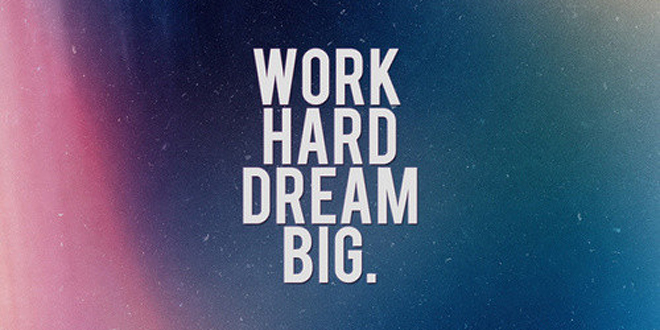 (ooooh yeah, the new year means motivational images like crazy)
(ooooh yeah, the new year means motivational images like crazy)
Spend more time on business development
This dovetails into delegating more effectively; when you run your own business and are managing client expectations, pitching ideas, going to meetings, writing copy, and doing all of the other day-to-day tasks that involve running a business it can be easy to forget about the most important business you manage: your own.
I've asked many mentors and friends about this, and they all agree: the first thing to slip when you start getting busy is your own business development. However, ongoing business development is critical when it comes to long-term success, and in 2017 and the following years I want to make more time to focus on building my business as well as my clients' businesses.
Some steps I want to take in this area are:
- Redefining "work". Most people look at business development as work, but writing and being creative are things that I enjoy, and I need to start re-framing business development as things I like doing in my leisure time when I'm not taking care of clients.
- Delegate more effectively. This deserves a second mention because I struggle with it and it will be essential to finding time for business development. Being too busy blocks my creative process.
- Work in inspiring places. Sitting at home with my laptop on a Saturday afternoon feels a bit boring, so getting out to coffee shops and bars where I can sit and work outside of the house will help me feel invigorated and encourage me to be creative.
Your turn
While my focus is on business development, the steps below are designed to help anyone with a creative passion that often takes a backseat to other things in life:
- Assess the benefits. Write down the benefits of spending time on your project. Some benefits could be "improve my craft or practice", "move my business forward", "earn more revenue" etc.
- Schedule in time. I talk about scheduling a lot because it is the most important way to stay on track. Look at your calendar and block out time to work on your projects or hobbies, and stick to them.
- Find mentors and inspiration. Talk to other like-minded people in your field, join an active Facebook group for people with similar interests, and read blogs and books about your passion or hobby to stay inspired.

Read more books
One of my favourite things to do is start my workday with a thermos of coffee and the front page of HackerNews (among others). I spend 20-45 minutes every day reading articles, bookmarking important information, and adding to my list of resources.
However, as many of you know there's a big difference between reading several articles a day and reading a good, old fashioned book.
Last year I read about a dozen books, which is pretty good, but I read pretty quickly and honestly there's no excuse other than I've chosen to prioritize other things. This article about finding time to read was a bit of a slap in the face, and has helped me decide to make reading physical books a priority this year.
Your turn
Making time to read more can be challenging (believe me) but below are a few things you can do to make more time to sink into a juicy novel or two over the coming months:
- Schedule in time to read. I find that it's easiest for me to make time to read before bed, after my day is done and I can relax. If this doesn't work for you, make a point to read on your lunch break, during your commute (if you don't drive) or over your morning coffee.
- Make a list of books you want to read and review it often. Fill your list with books by people you admire, interesting fiction (reading fiction makes you a better person), and books that capture your interest and which you are genuinely excited to read.
- Prioritize reading. It's easy to get sucked into an Instagram black hole or get swept up with the latest mobile game, so put your phone face down and store your laptop out of view. Focus on your book (or e-reader) and nothing else for as long as you can. Trust me, it'll be hard at first but the more you do it the longer your attention span will get.
Forgive more readily
Forgiveness is hard. It's easy to stay mad at people, or to hang on to hurt feelings and resentment. I told my therapist today "it's easier to be angry than it is to empathize with someone" and it's true, but hard things are the things worth doing because they make us better people in the long run.
2016 was the year that I started to learn to forgive people: my parents and family who failed me, people who hurt my feelings, acquaintances or strangers who spoke or acted thoughtlessly, and, most importantly, myself. I started to learn to forgive myself.
With that in mind I'm going to do my best to be a positive influence on those around me, and to learn to forgive more easily and not hold onto anger, resentment, and guilt.
Your turn
It seems like everyone has an axe to grind with 2016; whether it's the loss of a favourite celebrity, a personal issue that you haven't resolved, a conflict with a coworker, or something else, below are a few ways you can move towards forgiveness this year:
- Accept that you can't change people. Many of us spend heaps of time stressing and worrying about other people (myself included) but the key to letting go is to accept that you can't change how people think, feel and act. You can only do the best you can and hope that others understand your actions.
- Stop creeping. Social media has made it easier than ever to "check up" on people, but opening up that Incognito tab only helps hold on to any negative feelings you may be harbouring. It won't make you feel any better, so just don't do it.
- Recognize that you're doing the best you can. You aren't perfect. You'll say awkward things, unintentionally hurt other people's feelings, and misstep because you're human. It happens, so do your best to say "I made that mistake, but now I know and I can do better next time."
What are your intentions for 2017? Tweet at me or comment below and let me know what you're doing in the coming year.
4 Quick Tips for Managing Client Expectations
- by Alyson Shane
One of the scariest and most challenging things about going from having an office job to running your own business is that you essentially go from having one boss, to having lots of mini-bosses. This means more deadlines, more phone calls and emails, more meetings... you name it, there's more of it. This also means that instead of one boss to keep happy, you now have three, or six, or sixteen, or sixty-six bosses to manage.
I'll be honest with you: if you run a client-facing business then there is a 100% guarantee that you will eventually have to deal with a tricky client situation (if you haven't already.) I can say this confidently because people are fickle and miscommunications happen.
So how can you manage your client's expectations? I'm glad you asked:
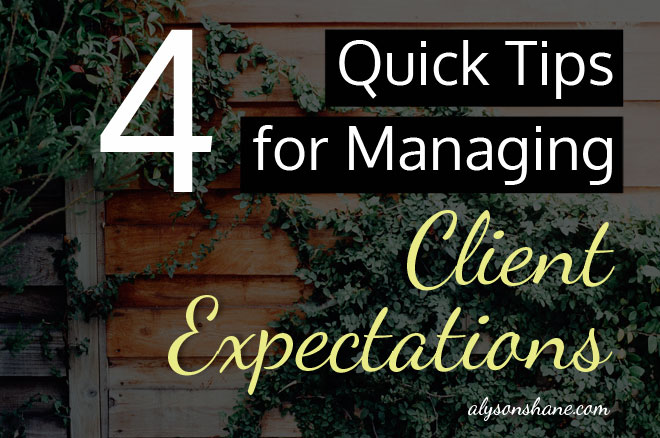
1. Keep your contracts clear
I cannot stress this enough. Don't just blindly sign, or skim over, an agreement between yourself and a new client. Contracts help keep you safe and can be instrumental to resolving disputes, clarifying issues, and other really important stuff.
In my experience I find that it's easiest to provide my clients with a contract for them to review, since I know the deliverable specifics that I need to include. It also means that I get to set the tone moving forward, and it's up to the client to make any revisions to my proposed contract, which is easier for me.
Thoroughly read through each and every client agreement and make sure that it clearly identifies the following:
- Your deliverables (monthly, per-project, or otherwise)
- Client deliverables (eg: are you waiting on information each month to create a newsletter?)
- Deliverable specifics
- Deliverable timelines, if necessary
- Payment schedules (eg: will you be paid monthly, as specific milestones are met, etc)
it's okay to go back and forth on a contract with a client. Remember: this is a negotiation, and it's better to hammer out specifics up-front so that there's no confusion about what your role is, and what you need to do for them so that you're all on the same page.
2. Under-promise and over-deliver
I'm not saying that you shouldn't go above and beyond for your clients, but giving yourself buffer room and quoting longer deadlines than you actually need can be an absolute lifesaver during busy times, or when complications arise with a project you're working on and revisions need to be done.
Not only does buffer room help you stay within a proposed timeline, but if you finish the project earlier than you quoted your clients will be over the moon for you.
3. On-board like a boss
On-boarding is critical to bringing on new clients seamlessly and make them aware of what to expect from you.
One of the things that I do to help manage client expectations is to provide a document that outlines my on-boarding process from start to finish. This document outlines the following:
- What they can expect to discuss at our each meeting/phone call
- What I need from them (eg: fill out the Brand Audit Worksheet)
- What I'll do post-meeting (eg: prepare a quote, send a contract, etc)
- Tasks, broken down by:
- Daily tasks
- Weekly tasks
- Monthly tasks
This is an approximation, as each client I work with is slightly different, but it's general enough that they know what to expect from me.
4. Set boundaries and keep them
Even if you work for yourself, keeping regular office hours is an easy way to manage client expectations. Let them know that you're at your desk from 8am - 4pm Monday - Friday (or whatever works for you) so they don't get upset that you didn't reply at 11pm on a Sunday.
I can't stress this enough: if you don't set boundaries your clients will dictate your life. Having regular office hours works for me, and I've been working towards only checking my email twice a day (it's harder than it sounds!) so that I can focus on doing work for my clients instead of spending all day replying to emails.
If you have a client that loves to get in touch after-hours (and some do) then let them know that you'll do your best to address their concern the next chance you have. This obviously doesn't apply to emergency situations, but day-to-day your clients should understand that you have a life outside of your work and should be understanding if you aren't available right that second.
---
Taking the time to set up a system that your clients can understand, and managing their expectations from the start is the easiest and best way to take care them and ensure that you have a positive, productive professional relationship for years to come.
Do you have any systems in place to keep your clients happy? Tell me in the comments!
Reflections on 365+ Days of Business Ownership
- by Alyson Shane
A few weeks ago I passed a significant personal and professional milestone:
June 30th, 2016 was my one-year anniversary as a full-time business owner.
The past 365+ days have been an incredible journey; I've learned a lot, made mistakes, discovered a lot about myself and my life has changed in so many ways that it felt appropriate to share some of the things I've learned this past year with all of you:
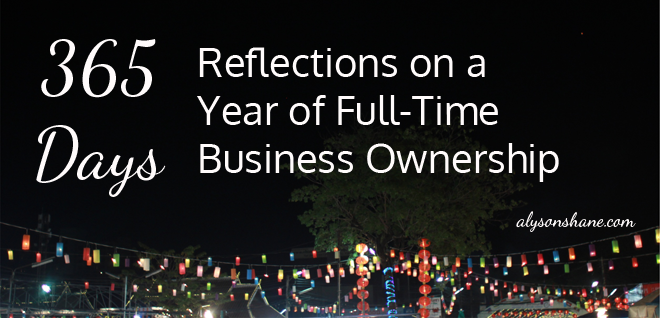
It's okay to not be a "good employee"
I'll be honest with you: I used to get depressed when I thought about my career. Even after going to university and working roles that were actually in my field (instead of being an accountant, oh my god) I'd still hadn't found a job that did it for me. I'd think of all those years ahead of me, likely spent in dull offices, trying to find a position or organization that hopefully wouldn't bore me to tears after six months and it was so depressing.
I also had a lot of anxiety around being a "good employee." I didn't like sitting at a desk for a pre-determined amount of hours, asking for permission to take an extended lunch or book an appointment, taking a vacation, or playing office politics (ugh). I'm also not afraid to stand up for myself and point out when I think something unfair or just plain wrong, which doesn't bode well in the world of 9-5's.
So what feels different? The biggest thing is that while I'm beholden to my clients, and I technically have more "bosses" now than I did before, we have a mutually respectful relationship which can be hard to find in the office world.
I'm honest with my clients, and they rely on me to create the right content and steer them in the right direction, which results in a level of respect and collaboration that I was never able to enjoy when I worked for someone else.
Your value isn't just tied up in your qualifications
Before I went to university the advice everyone gave me was "you have to go to university! You'll never be able to get a decent job if you don't go to university!" So that's what I did. I spent three years at the University of Winnipeg earning my Bachelor of Arts, and you know what? Not one of my clients has ever asked me about my formal education.
To be clear: I am in no way saying that getting an education isn't worth it. University was an amazing experience, and I learned a lot, but when it comes to running a service-based business my experience has been that it's more important to be able to demonstrate your value and your skills than it is to have a piece of paper that declares it for you.
Instead, people look at my website, blog, social feeds, and where I've been published or asked to speak to see examples of my knowledge.
You can say no to things that you don't want
One of the most empowering things that I've learned in this past year is to say "no" when something doesn't make me feel good. I don't take on projects that I don't want, and I don't work with clients that I don't like.
This is incredibly hard to do; we're conditioned to believe that every opportunity that comes our way may be the last, and especially when you're new to being a solo business owner it's hard not to think "if I don't take this, will I regret it? Why am I turning down money? Who in their right mind turns down money?!"
Except money isn't the key to happiness. Instead of chasing money, I chase value. I've turned down opportunities that could have resulted in a nice boost to my bank account, but which would have made me miserable, and I don't regret them at all. Instead, I focus my energy on finding opportunities and work that are more suited to my tastes and personality, and it feels amazing.
Irregular income takes some getting used to
Before I started working for myself I would say things like "I could never go from biweekly payments, it's so scary!" and you know what? It is, and it takes some getting used to.
Being paid on a monthly or irregular basis means that I have to pay more attention to my bank balance than I did before, but since I was planning to leave my 9-5 I spent a few months building up a nest egg which rolls over from month to month. That way I know that I have enough to cover my living expenses for a few months if a bunch of work dried up at once.
However, I think that this is worth mentioning: even though I get paid irregularly, diversifying my income feels more secure than a single job ever did. When I worked for someone else if I lost my job 100% of my income was gone, but now if I lose a client I just hustle a bit harder and find another one to replace that dip in my income.
Also, as I said above since all of my earning potential is wrapped up in how hard I work it often means that I make double or triple one month what I made the previous one.
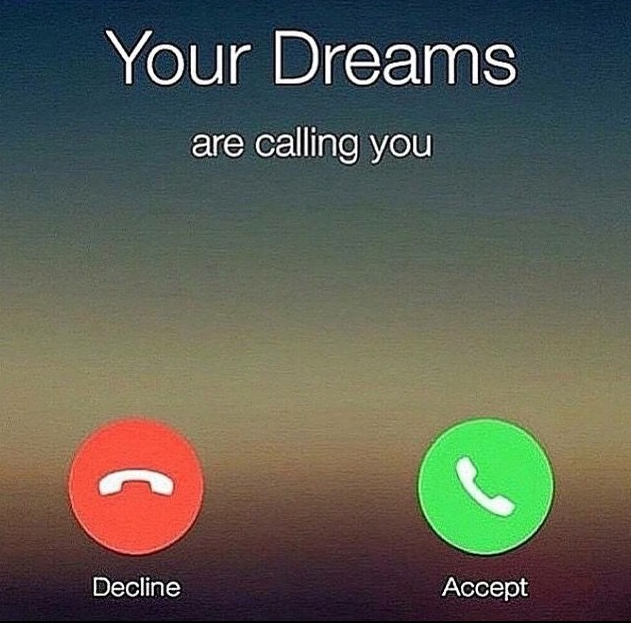
The freedom of managing your life is the most worthwhile thing
This is the single biggest takeaway that I can share with you.
I grew up believing that my work was just a means to an end; that I shouldn't expect to like my job or my work and that sitting at a desk doing uninspiring things for 40 hours a week was all I could ever hope for out of my life. This is such utter bullshit, you guys.
I've enjoyed a year of having the freedom to choose the work I want; to take an afternoon off to go shopping with a friend; to work on a Sunday or during the evening; to take a 3-week vacation to Central America and to work on the road.
I do what I want and am building my ideal life on my terms, and I get to grow something amazing and completely my own all from scratch. The work I do is fun and rewarding, and most importantly it makes my clients feel good, too.
Personal takeaways from 365+ days
I used to feel trapped by my life.
I didn't know what I wanted to do, where I wanted to go professionally, and I felt shackled to a corporate work and life that I resented and which, frankly, wasn't a good fit for me. It wasn't until I started building my client list and hanging out with other creatives and entrepreneurs that I realized that doing the thing that you love for a living is the key to being truly happy all the time.
The past 365+ days have been an exercise in un-learning a lot of things that I thought I knew about my value as a person and a creative professional. I've also learned so much about myself and have developed such a deep appreciation for my life that I can barely put it into words. It's been an exciting, challenging, and rewarding experience that I wouldn't trade for anything.
Thank you to my fantastic partner John, my incredible and supportive friends, and to my clients who do me the honour of working with me.
